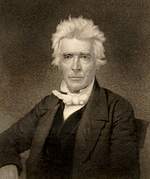Living Oracles on:
[Wikipedia]
[Google]
[Amazon]
The Living Oracles is a translation of the New Testament compiled and edited by the early Restoration Movement leader Alexander Campbell.Gary Holloway
"Alexander Campbell as a Publisher"
'' Restoration Quarterly'', Vol. 37 No. 1 (1995)Douglas Allen Foster and Anthony L. Dunnavant, ''The Encyclopedia of the Stone-Campbell Movement: Christian Church (Disciples of Christ), Christian Churches/Churches of Christ, Churches of Christ'', Wm. B. Eerdmans Publishing, 2004, , , 854 pages, entry on ''Bible, Versions and Translations of'' Published in 1826, it was based on an 1818 combined edition of translations by George Campbell, James MacKnight and Philip Doddridge, and included edits and extensive notes by Campbell.Douglas Allen Foster and Anthony L. Dunnavant, ''The Encyclopedia of the Stone-Campbell Movement: Christian Church (Disciples of Christ), Christian Churches/Churches of Christ, Churches of Christ'', Wm. B. Eerdmans Publishing, 2004, , , 854 pages, entry on ''Campbell, Alexander''
 Campbell was motivated by a belief that changes in the English language and the availability of improved critical editions of the Greek
Campbell was motivated by a belief that changes in the English language and the availability of improved critical editions of the Greek
Second Edition
issued in 1828
1827 Edition
of the unrevised text by G. Campbell, Macknight and Doddridge used by Alexander Campbell
published in 1835 (html) {{Restoration Movement 1826 non-fiction books 1826 in Christianity 19th-century Christian texts Bible translations into English Restoration Movement New Testament editions
"Alexander Campbell as a Publisher"
'' Restoration Quarterly'', Vol. 37 No. 1 (1995)Douglas Allen Foster and Anthony L. Dunnavant, ''The Encyclopedia of the Stone-Campbell Movement: Christian Church (Disciples of Christ), Christian Churches/Churches of Christ, Churches of Christ'', Wm. B. Eerdmans Publishing, 2004, , , 854 pages, entry on ''Bible, Versions and Translations of'' Published in 1826, it was based on an 1818 combined edition of translations by George Campbell, James MacKnight and Philip Doddridge, and included edits and extensive notes by Campbell.Douglas Allen Foster and Anthony L. Dunnavant, ''The Encyclopedia of the Stone-Campbell Movement: Christian Church (Disciples of Christ), Christian Churches/Churches of Christ, Churches of Christ'', Wm. B. Eerdmans Publishing, 2004, , , 854 pages, entry on ''Campbell, Alexander''
Characteristics
 Campbell was motivated by a belief that changes in the English language and the availability of improved critical editions of the Greek
Campbell was motivated by a belief that changes in the English language and the availability of improved critical editions of the Greek New Testament
The New Testament (NT) is the second division of the Christian biblical canon. It discusses the teachings and person of Jesus in Christianity, Jesus, as well as events relating to Christianity in the 1st century, first-century Christianit ...
had made the Authorized King James Version obsolete. In developing the translation, Campbell relied on the critical Greek text published by Johann Jakob Griesbach. One notable feature of the translation is the replacement of traditional ecclesiastical terms such as "church" and "baptise" with alternative translations such as "congregation" and "immerse". The ''Living Oracles'' has been described as a forerunner of modern language translations in its updating of the traditional King James language and use of the work of textual critics such as Griesbach.
Reception
The translation was widely used within the Restoration Movement, but was criticized by others for its translation of ''βαπτίζω'' (''baptizô'') as "immerse" rather than "baptize". Because of the way this word was translated, the ''Living Oracles'' was most often used by those who believed inimmersion baptism
Immersion baptism (also known as baptism by immersion or baptism by submersion) is a method of baptism that is distinguished from baptism by affusion (pouring) and by aspersion (sprinkling), sometimes without specifying whether the immersion is ...
and most vigorously criticized by groups practicing infant baptism by sprinkling.
References
External links
Second Edition
issued in 1828
1827 Edition
of the unrevised text by G. Campbell, Macknight and Doddridge used by Alexander Campbell
published in 1835 (html) {{Restoration Movement 1826 non-fiction books 1826 in Christianity 19th-century Christian texts Bible translations into English Restoration Movement New Testament editions